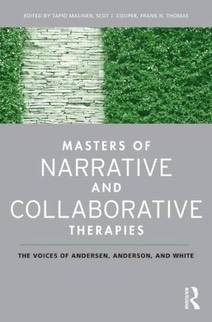For many years Michael White (co-founder of narrative therapy) had been demonstrating a brief narrative practice as he often provided live demonstrations of narrative therapy in training contexts. That was a rare practice in the field but those demonstrations pushed our conception of what might be possible in narrative therapy especially in time constrained circumstances.
With the rapid emergence of mental health Walk-in Clinics and the time limits applied to employee assistance programs by insurance companies a brief narrative practice finds increasing relevance on the service landscape.
What is most compelling about this therapy is a practice that is not separate from the politics of culture or therapy. Particular attention is given to reflection about the effects of practice on the real lives of people. How do our practices effect how people come to know themselves? How do they effect people's experience of personal agency; the ability to make decisions in their own lives? These questions become even more urgent under time constraint without the luxury of future conversations to track progress or amend mishaps.
A brief narrative practice involves a collaboration that seeks and activates people's own knowledge to address their concerns and predicaments as shared through the stories they tell. These (local) knowledges, when brought into 'stories in the making' can be developed into proposals for action encompassing counter-actions, counter-thoughts, and problem deconstruction. People experience themselves as knowledged, with the skills and experiences that allow them to address their concern or to more fully step into preferred ways of living.
Why Brief Narrative:
Ideas related to therapy
- Therapy is viewed as a social arena in which people enter 'ceremonies of re-definition'. As such people have an opportunity to make visible and have witnessed that which has been made invisible, been overshadowed, or not brought into story lines. People are involved in a experience of co-authoring alternative stories of life and identity,
- As a ceremony of sort there is a start and coherent finish to the encounter in which people depart from old ways, moving towards thinking and proceeding differently as they forge ideas about how now to proceed in life.
- Relationship is a relational project shaped and preformed through our responses. Relationship is fostered through responsiveness.
Ideas Related to how people come to know themselves
- Many of the practices of narrative therapy assist people to move away from limiting and problematized identity claims that represent problem-saturated accounts of their lives,
- Provides processes to quickly identify and begin to contextualize more preferred and dignifying identity conclusions,
Ideas related to outcomes
- We facilitate a process in which next steps are co-developed, locally-generated, contextually specific, and culturaly relevent. Everyone leaves with a unique tailored plan for addressing their circumstances.
- Life is a place to practice or exercise their plan/project.
This workshop will articulate the founding premises upon which brief narrative practice has developed. The foundational skills for brief narrative therapy will be shared and demonstrated through video presentation. People will have time to practice these skills that can be taken into their practice immediately.
